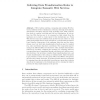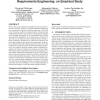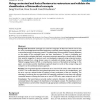40 search results - page 8 / 8 » Nonmonotonic Reasoning with Well Founded Semantics |
SEMWEB
2004
Springer
13 years 11 months ago
2004
Springer
Abstract. OWL-S allows selecting, composing and invoking Web Serdifferent levels of abstraction: selection uses high level abstract descriptions, invocation uses low level groundi...
AOSD
2009
ACM
13 years 9 months ago
2009
ACM
Most current aspect composition mechanisms rely on syntactic references to the base modules or wildcard mechanisms quantifying over such syntactic references in pointcut expressio...
ESWA
2006
13 years 5 months ago
2006
Following the advent of the Internet technology and the rapid growth of its applications, users have spent long periods of time browsing through the ocean of information found in ...
BMCBI
2007
13 years 5 months ago
2007
Background: Biomedical ontologies are critical for integration of data from diverse sources and for use by knowledge-based biomedical applications, especially natural language pro...
ICLP
2009
Springer
14 years 6 months ago
2009
Springer
The SLG-WAM of XSB Prolog soundly implements the Well-Founded Semantics (WFS) for logic programs, but in a few pathological cases its engine treats atoms as undefined that are true...




